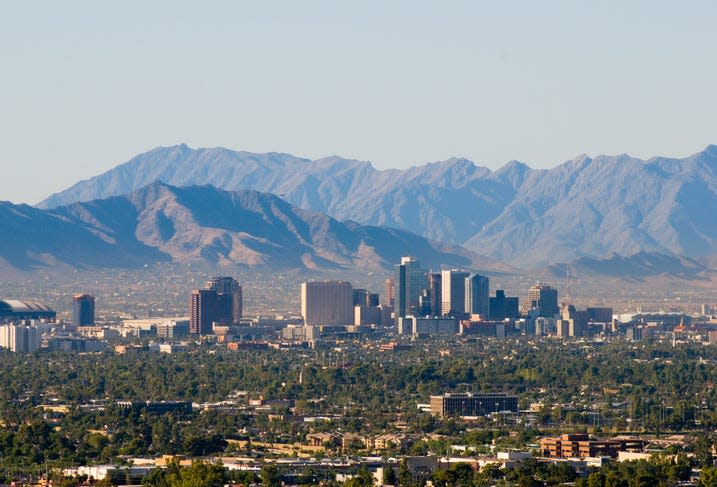Is Phoenix really worse than Green Bay? Why area ranks low on 'best places to live' list
Are Huntsville, Alabama; Fayetteville, Arkansas; Fort Wayne, Indiana; and Lancaster, Pennsylvania, all better places to live than Phoenix? According to U.S. News and World Report’s latest rankings of the best places to live, they are.
In fact, the Phoenix area was ranked 110th out of the 150 largest metro areas in the country for best places to live, based on a variety of factors, including value, quality of life, desirability and job market.
Tucson fared slightly better, achieving a ranking of 96. At the top of the list was Green Bay, Wisconsin.
Phoenix’s lowest ranking came from the “value” category, which includes housing affordability and price parity. The study cites the housing affordability index, a metric measured by Wells Fargo and the National Association of Home Builders.
At the end of 2022, metro Phoenix’s housing affordability index was 22.5, meaning that only 22.5% of homes sold were considered affordable for a family earning the area median income.
Nationally, about 42.2% of homes sold during the same period were affordable for a family making the median wage, according to the index.

Affordability surfaces as issue, but 'it's all relative'
For a region like greater Phoenix that has long been marketed as an affordable alternative to otherwise attractive cities like San Francisco and Seattle, rising housing costs have become a concern.
Chris Camacho, president and CEO of the Greater Phoenix Economic Council, an economic development advocacy organization for the region, said Phoenix, like many other desirable markets, has seen significant home price increases in the past few years.
However, he said the jobs market, and corresponding wage growth, will continue to make the Phoenix area a desirable place for people to move to and live.
Affordability is a challenge that state leadership has acknowledged. The governor's budget has allocated funds to affordable housing through the state's housing trust, Camacho said.
However, when courting business to come to Arizona, Camacho said the companies he talks to have the option of moving anywhere in the country, and many are coming from more expensive markets.
"The costs for them, it's all relative," he said.
The ranking notes that average salaries in Phoenix are slightly below the national average, but Phoenix remains more affordable than coastal cities such as San Francisco or New York. However, despite the higher cost of living, both of those cities ranked better places to live than Phoenix.
Some of the data used in the ranking raises some eyebrows. According to the U.S. Bureau of Labor Statistics, metro Phoenix’s unemployment rate at the end of March 2023 was 2.9%, much lower than the rate the study cites.
The unemployment rate and the area’s average annual salary, which was $56,610, according to the report, are used to create the job market criteria for the ranking.
'Weather temperateness' not a strength, but transportation is
Some factors in the ranking, Phoenix advocates are quick to point out, are clearly stacked against Phoenix. The “desirability index” portion of the study includes a score for “weather temperateness,” measuring the number of days when the temperature is between 32 and 90 degrees Fahrenheit. In 2022, Phoenix had 187 days when the temperature was above 90 degrees, according to the National Weather Service.
Camacho said GPEC leaders are "very direct" with people about the Phoenix heat, which could be as uncomfortable to some as a bitterly cold winter.
"There are things you can do to reduce the impact of the heat, whether it's a pool, staying indoors, having air conditioning," he said. "But it's not like somewhere like Chicago, where you have to shovel your way through your day."
Phoenix ranked 18th for fastest-growing places, highlighting the net migration to the Valley. The average commute time in Phoenix was about 27 minutes, according to the study, and the percentage of commuters by car in Phoenix is about equal to the national average.
Phoenix's regional grid transportation system often gets overlooked as a benefit, Camacho said, but can make a big difference for businesses that drive often and people trying to commute.
Other factors in the ranking included crime rates, quality of education, commute times, availability of health care, air quality and the ratio of restaurants and drinking establishments per 100,000 people.
Reach the reporter at cvanek@arizonarepublic.com. Follow her on Twitter @CorinaVanek.
This article originally appeared on Arizona Republic: Why Phoenix ranks 110th on 'best places to live' list

